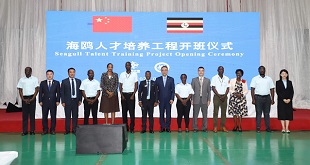Clearing obstacles
But several government ministries, departments, and agencies are taking measures not only to clear logistical obstacles but to ensure that the investments cement Uganda’s position as an East African regional logistics hub.
Benon Kajuna, the director of transport in the Ministry of Works and Transport says the government is working on several infrastructure projects geared towards boosting Uganda’s competitiveness in the region.
At the moment, 95% of freight destined for Uganda goes through the northern transport corridor— a road network which starts from the Mombasa seaport through Kenya and Uganda to Rwanda and Burundi and the Democratic Republic of Congo. It also links Kenya and Uganda to Juba in South Sudan.
Kajuna says besides building hundreds of kilometres of roads that link the country to its regional neighbours, the government is also modernising the other modes of transport.
Entebbe International Airport is being expanded at a cost of US$325m while the designs and master plan for a new airport at Kabaale near Hoima in mid-western Uganda are ready and construction is expected to start in the 2017/18 financial year.
The master plans and engineering designs for upgrading of Gulu, Arua, and Kasese aerodromes are complete while a revival of the national carrier, Uganda Airlines, is underway and it is expected to be launched by December, 2018.
Other projects include overhauling of the railway; including development of a Standard Gauge Railway logistics chain strategy for Uganda also expected to be done in the 2017/18 financial year. The government also intends to prioritize lake transport projects to help in the re-opening of the southern corridor through Lake Victoria to connect with a rail link in Tanzania to the Indian Ocean sea ports of Tanga and Dar es Salaam.
A new port on Lake Victoria with capacity to handle 7.5m tonnes of freight every year is to be built at Bukasa near Kampala city at €350 million. In addition, a remodeling and expansion of Port Bell and Jinja ports also on Lake Victoria at a total cost of US$100 million is planned.
Kajuna says construction of one stop border posts at Malaba, Busia, Mutukula and Mirama Hills is already complete while construction work for Katuna and Elegu are ongoing. The designs for Mpondwe and Ntoroko border posts are expected to start in the 2017/18 financial year. These are intended to end the poor connectivity of modes of transport and long delays of cargo at the port and border posts.
Regional competition
Uganda is, however, not the only country in the region that is frantically undertaking logistical improvement in infrastructure and policies. Kenya, Rwanda, and Tanzania appear to be engaged in an infrastructure facilities race to either become or strengthen their positions as regional logistics hub.
President Yoweri Museveni noted this very well. He says although partnership between government departments and private sector players to eliminate the hurdles that have crippled Uganda for decades is good, the focus on becoming a regional hub is “selfish”.
“If every country makes itself a `regional hub’ none would succeed,” he said.
But logistics experts remain unshaken by cautious voices like Museveni. They say since the region has many players, if the Ugandan logistics industry does not move fast to create a regional hub, someone else will.
 The Independent Uganda: You get the Truth we Pay the Price
The Independent Uganda: You get the Truth we Pay the Price


